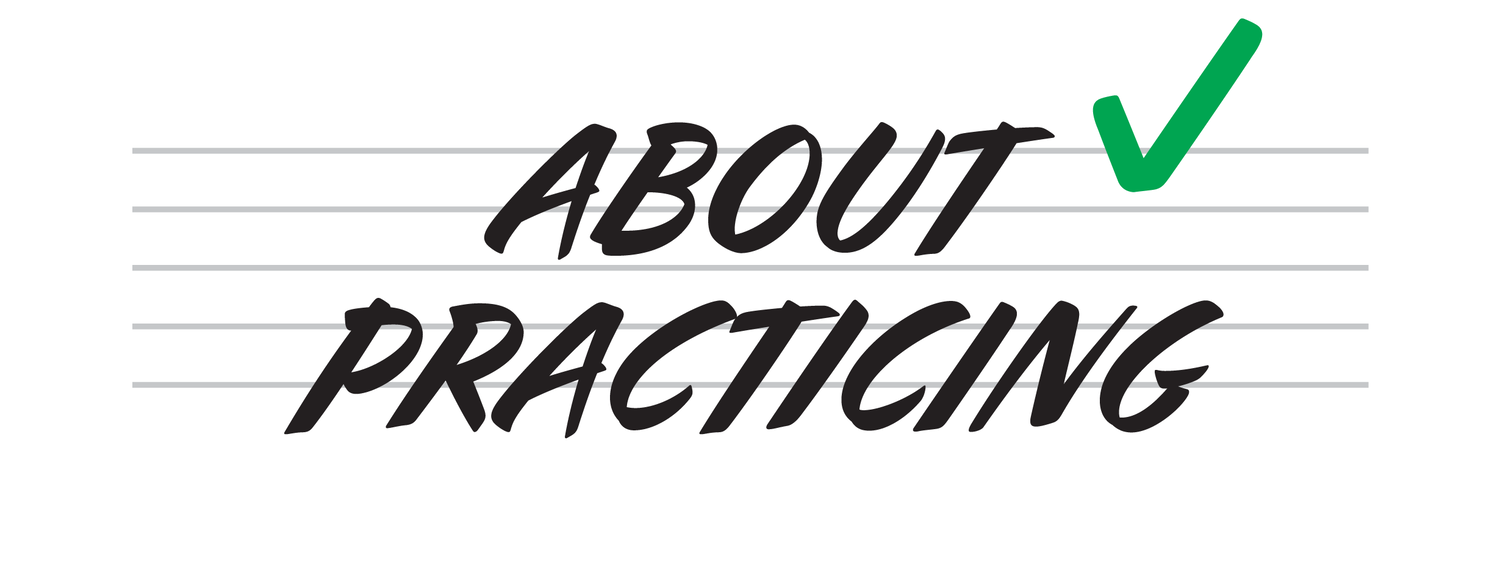I hope you’re enjoying First, Learn to Practice. Thanks for visiting AboutPracticing.com. Here’s your free article - and don’t miss the extras at the end!
- Tom Heany
How to get the most out of an hour of practicing.
[Click here to download the article.]
Let's say you have decided to practice your instrument for an hour every day. How do you get the most out of that hour? These ten tips can make your practicing easier and more effective. Try a few, or all ten. (There are exercises, worksheets and other useful things at the end of this article - don’t miss them!)
BEFORE YOU START:
Schedule your practicing a week at a time. Consider everything you need to consider, then pick an hour each day you know you can reserve for practicing, and put it in your calendar. Make it as close to the same time every day as you can. Commit to it. Hang a calendar on the wall and mark each day you practice with a big red X, or a heart, or a gold star.
Create your space. Dedicate the area you'll practice in to practicing. Make it comfortable. Gather the materials you'll need – paper, pencil, glass of water, metronome, tuner, note book, the music books you're working from, your instrument - so you don't have to get up while you're practicing. Get rid of anything you don't need that might be a distraction – cell phone, music books you're not working from, computer, snacks. Close the door to the room if you can. Let people know that you're practicing for the next hour and you want to be left alone.
Get yourself ready. Remind yourself that it is OK for you to set this time aside to practice. Think for a minute about the player you are working on becoming: who is that person? What is your life like when you play that way? Your practicing is what makes you that person. Make it a priority.
WHEN YOU PRACTICE:
Have a plan. Your plan can be whatever works for you. If you don't know what that is yet, try this. Divide your practicing time into quarters. For each quarter, work on only one thing. It could be a song; it could be a scale; it could be a technique. But just one thing. See how that works for a week or two, and then adjust it as necessary.
Limit your targets. It's tempting to try to touch a lot of subjects, but it's very hard to improve that way. You get better at what you focus on, and that focus takes time.
Get outside your comfort zone. Spend a good chunk of your time a little outside your comfort zone. Whatever you're practicing, you should have to push a little to get it right. Not too much, though. Just enough so that you have to work at it.
Take a break. After 15 minutes, stop what you're doing and stretch your arms, back, shoulders and hips. If you practice for an hour, take a five minute break after 30 minutes. Set a timer for 5 minutes; leave the room; stretch; get away from practicing. When the timer goes off, start practicing again.
Take notes. Many of the things you learn in practicing are hard to remember. Write them down in your notebook. Some of the things you learn will be easier to figure out on paper. Write those down, too. Your notes will remind you tomorrow what you worked on, discovered, and accomplished today. And that will remind you that you performed the most essential practicing feat of all: you showed up.
Start and end with something you like. By definition, you spend a lot of practice time working on things you don't know yet and can't do yet. That's just how it works. But there's plenty of stuff you do know and can do. Start with something like that, and it will be easier to settle in for an hour. End with something like that, and it will stick in your mind until your next practice session.
Set up for tomorrow. Check your note book to make sure you got to everything you had planned to get to. Write down what you learned. Leave yourself some notes for tomorrow to help you get started. Leave your practicing space in order, so it will call your name tomorrow when it's time to start again.
Wait! You get these, too.
The best musician I can be
Imagine yourself as the best musician you can be. You can play anything you want, sing anything you want. You're respected and admired by all the musicians you look up to today. Who would you be? What would that feel like? This exercise will help you imagine your future musical self.
Create your space
Your practice space can make your practicing easier with a little planning. Use the suggestions on this list (as many as you like) to make your practice space work for you.
Scheduling contract
Scheduling your practicing is one of the simplest ways I know of to improve your practicing and your playing. Download this scheduling contract and use it every week.
Set up for tomorrow.
Run through this check list as the last step in your daily practice routine. Tomorrow’s practice will be easier if you pan for it today.
Take notes.
A notebook can be a very useful tool in your practicing routine. The more you use it, the more it becomes yours. And the more it becomes yours, the more useful it will be. If you haven't used a practicing notebook before and you're wondering how to get started, try a few of these suggestions.
